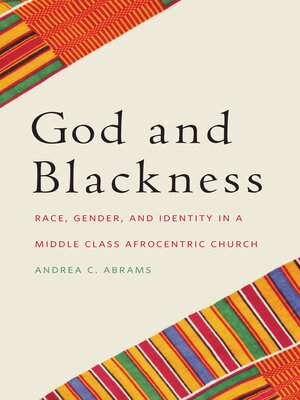God and Blackness
ebook ∣ Race, Gender, and Identity in a Middle Class Afrocentric Church
By Andrea C. Abrams

Sign up to save your library
With an OverDrive account, you can save your favorite libraries for at-a-glance information about availability. Find out more about OverDrive accounts.
Find this title in Libby, the library reading app by OverDrive.



Search for a digital library with this title
Title found at these libraries:
| Library Name | Distance |
|---|---|
| Loading... |
Blackness, as a concept, is extremely fluid: it can refer to cultural and ethnic identity, socio-political status, an aesthetic and embodied way of being, a social and political consciousness, or a diasporic kinship. It is used as a description of skin color ranging from the palest cream to the richest chocolate; as a marker of enslavement, marginalization, criminality, filth, or evil; or as a symbol of pride, beauty, elegance, strength, and depth. Despite the fact that it is elusive and difficult to define, blackness serves as one of the most potent and unifying domains of identity.
God and Blackness offers an ethnographic study of blackness as it is understood within a specific community—that of the First Afrikan Church, a middle-class Afrocentric congregation in Atlanta, Georgia. Drawing on nearly two years of participant observation and in‑depth interviews, Andrea C. Abrams examines how this community has employed Afrocentrism and Black theology as a means of negotiating the unreconciled natures of thoughts and ideals that are part of being both black and American. Specifically, Abrams examines the ways in which First Afrikan's construction of community is influenced by shared understandings of blackness, and probes the means through which individuals negotiate the tensions created by competing constructions of their black identity. Although Afrocentrism operates as the focal point of this discussion, the book examines questions of political identity, religious expression and gender dynamics through the lens of a unique black church.







